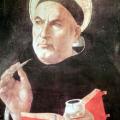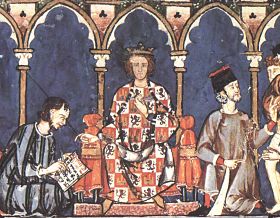246. What Pleases the Prince: The Rule of Law
Natural law and political legitimacy in thirteenth century thinkers up to and including Thomas Aquinas.
Themes:
• R.J. Henle (ed. and trans.), St Thomas Aquinas: the Treatise on Law (Notre Dame: 1993).
• J. Finnis, Aquinas: Moral, Political, and Legal Theory (Oxford: 1988).
• J. Goyette, M. Latvic, and R.S. Myers (eds), St. Thomas Aquinas and the Natural Law Tradition: Contemporary Perspectives (Washington DC: 2004).
• M.M. Keys, Aquinas, Aristotle and the Promise of the Common Good (Cambridge: 2006).
• A. Lisska, Aquinas’ Theory of Natural Law: An Analytic Reconstruction (Oxford: 1996).
• O. Lottin, Le droit naturel chez St Thomas d’Aquin es ses prédécesseurs (Bruges: 1931).
• D.M. Nelson, The Priority of Prudence: Virtue and Natural Law in Thomas Aquinas and the Implications for Modern Ethics (University Park PA: 1992).







Comments
Aquinas's treatise to the King of Cyprus
Great episode! I was wondering about the comment the on Aquinas's treatise wondering "how much of it is from his pen". You note that is bears the hallmarks of his Aistotelian approach, but what aspects of the treatise cause scholars to doubt he actually wrote it? (Also, is it the De Regno?)
Thank you!
In reply to Aquinas's treatise to the King of Cyprus by Esherman
De Regno
Yes, that is the text I meant. I think that the worry is basically just that some of the ideas don't fit with what he says elsewhere, but I don't have this clearly in my memory anymore I'm afraid. Consulting my notes for the episode I see that Finnis, Aquinas: Moral, Political, and Legal Theory has a discussion of De Regno at 228 and following, with authenticity discussed at 246; and also that Keys, Keys, Aquinas, Aristotle and the Promise of the Common Good, 64, argues that most of it is not by him. Sorry I can't dredge the details out of my brain, I guess I replaced it with some piece of information about the Italian Renaissance!
Power distribution between officers
the idea that the prince should have his powers implemented by officers reminds me of confucian thought on the emperor being a central point that organises his ministers, who themselves are the ones who use these powers. It's just something I didn't expect would be shared between the two belief systems and it makes me wonder how similar the two systems are to each other. Bit open ended I know.
Natural Law
Thank you for this episode, and for all of them. In regard to St. Thomas Aquinas, at least, one would have to take into account the words on Natural Law in St. Paul's Letter to the Romans, ch. 2. This passage would certainly have been second nature to Aquinas. I would imagine that he was also acquainted with what Cicero says: "For there is a true law: right reason. It is in conformity with nature, is diffused among all men, and is immutable and eternal; its orders summon to duty; its prohibitions turn away from offense .... To replace it with a contrary law is a sacrilege; failure to apply even one of its provisions is forbidden; no one can abrogate it entirely." (Rep. III, 22, 33, as quoted in CCC 1956.)
Thank you for your consideration.
Lucretius
In your book about Hellenism your write that De rerum natura was rediscovered in the eighteenth century. But there are other books which says that they read in the rennaicance! How come?
In reply to Lucretius by Lars Östh
Rediscovery of Lucretius
Oh sorry you must have misunderstood what I wrote there. What was discovered in the 18th century was the papyrus find in Herculaneum, which contains "On Nature" by Epicurus, and that was a major source for Lucretius. Lucretius' own Latin poem, De rerum natura, was indeed rediscovered in the Italian Renaissance.
Add new comment